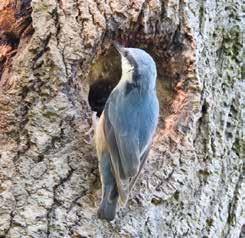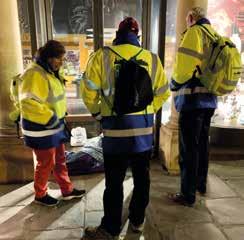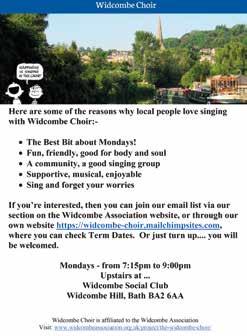
6 minute read
Out & About Wild in Widcombe
One of the most dramatic environmental improvements in Widcombe in recent years has been the transformation of Lyncombe Hill Fields. Local residents now manage the fields through a licence with the Council with the aim of improving public access and enhancing the variety of wildlife habitats. Wildflower meadows are being restored. Numerous bird boxes have been installed to cater for a greater variety of birds. Hedges have been re-laid and mini-plantations of native tree species planted. There is even a bug hotel to cater for mini-beasts.
All this goes on alongside improvement of paths, provision of benches and updating of high-quality information boards by residents and volunteers. Regular bulletins on all the activities are sent to Friends and Supporters, telling people what to look out for during the changing seasons, together with a great array of wonderful photographs. Friends of Lyncombe Hill Fields refer to the transformed space as Our Wild Hilltop Paradise.
Advertisement
Once a month I am happy to join a small group to record the variety of birds. The number of species varies with the seasons and the weather on the day, but the average is 17 different species, with a maximum daily count of 23. Alongside common garden birds, there are nuthatch, two kinds of woodpecker, warblers such as chiffchaff and blackcap, and birds of prey including buzzard, kestrel and sparrowhawk. We also regularly see ravens overhead. In spring, I lead small parties to enjoy the dawn chorus.

Ensuring the health and wellbeing of night revellers

Until he retired in 2015, Widcombe resident David Holden-White was a defence solicitor. His work gave him ample opportunity to consider responses to wrongdoing other than handing out prison terms and a criminal record. These days he applies his practical style of empathy to his Christian-led work with Bath City Pastors, an organisation that sends its volunteers into the centre of the city at night to help, advise, protect and guide anyone who might find themselves in difficulty.
become separated from the friend she was staying with and had her house-key but no idea where the house was.
On many days I visit the fields by myself, just to watch and relax in the midst of nature. Sitting quietly for an hour brings a special quality to life. I am rarely disappointed. There are conversations too. Meetings with total strangers, often with dogs, who invariably tell me how much they enjoy their visits. Some say it has completely changed their lives. It certainly strengthens our local community.
So I am not surprised that contact with nature can be beneficial for those who experience mental illness. Realisation that nature can provide a cure has become much more widely accepted, especially since the covid pandemic. Some doctors regularly prescribe courses of treatment based on ecotherapy. We are fortunate in Widcombe to have nature all around us, just part of life.
Many organisations have provided financial support for the project on Lyncombe Hill, including the Heritage Lottery Fund, Bathscape, the Widcombe Association, the Council, and many others. If you are interested in getting involved please contact lyncombehillfields@gmail.com.
■ David Goode
‘The idea,’ says David, ‘is to share God’s love with people who are vulnerable, those who live on the street and those who make themselves vulnerable today because of drugs or alcohol or the cold.’
On the night that I accompanied David and his team on their rounds, our first success was to find a large sheet of cardboard for a man settling to sleep on the cold paving in a shop doorway. As we walked around the streets, David and his team were linked by walkie-talkie to the venues and the councilfunded security team. They exchanged alerts about a missing girl, a young man slumped on the pavement outside one of the popular venues, and a girl who had
The team approaches each case with gentleness and offers simple practical help – flip-flops for bare feet at the mercy of broken glass, hats and gloves, blankets for those who came out without a coat, hot drinks and a cereal bar to start conversations with regulars. As they walk their considerably more than 10,000 steps a night they also scoop up the discarded bottles to stave off glass fights.
The team (generally of four) always includes at least one woman whose presence, David explains, quietly diffuses any hostility from those they are trying to help. ‘We try to be prayerful and to take a sympathetic interest to people in difficulty. But we have high-vis jackets and walkie-talkies – we can look a bit official. The women volunteers are often older. They could be your aunty or your gran. That is very helpful.’
The team prays for a quiet night and nobody hurt. Generally, their prayers are answered and David believes their presence every Friday and Saturday from 10pm until as late as 3.00 or 4.00am plays its part.
■ Colette Hill
Before After
How to start a community garden
Dolemeads Community Garden – a small oasis on land going spareopened at last this summer. The project involved many people and much work. So how did they do it? Rachel Meyrick talks us through the steps. Find a free space - any unused piece of land and look into who owns it

In Dolemeads, there was a fenced triangle of land next to the railway arches, which had been used as a toddler playground. Its owner, Curo, had removed the play equipment, leaving scrubland and weeds. We asked if we could use it and Curo bequeathed the land for community development.
Come up with a vision for the land through consultation
We leafleted Dolemeads with questions of what we could use the area for. Suggestions included: places to sit, allotments, scooter park, exercise area, recycling park, and many more. We put all the ideas together to see how they could be combined in the space, then shared the results. This was the basis for…
Create a design
Dolemeads resident Phil Allen is a retired horticulturalist. He used the ideas from the consultation to create a design. He recommended trees, shrubs and which planting would suit the soil and the area. But we couldn’t do that alone. We had to…
Look for funding
It really helps if you have or can form a residents’ association. We became a subgroup of the Widcombe Association and were able to use its bank account to receive funds. We contacted large local big businesses, but without luck. Most of the small businesses in the arches were supportive of the project, sometimes with in-kind donations. Eventually, we applied for and won funding to create the entire garden from the National Lottery Community Fund.
Plan workdays and find people who are willing to put some hours in
We had no contractor or labour-cost funding, so all the work was done by residents and friends. On reflection, it would have been better to apply for more funding to include subcontractor fees! Some of the larger work was pretty challenging. Thankfully, some residents were on hand with tea and cake when they couldn’t dig or paint fencing. Others went all-in, working every available workday.
Celebrate!
In late August, we had our opening party to celebrate our new garden. Folk were encouraged to plant bulbs, and take collective ownership of the space. We now have beautiful fruit trees, shrubs, flowers, vegetables in planters and two benches to sit and enjoy it all.
Living with your community garden
We do all sorts of things in our gardenexercise, harvest, hold home-worker coffee mornings. It’s a very satisfying thing to come together and create something lovely out of an abandoned piece of scrubland. If you are passing through Dolemeads please drop in, have a sit down and enjoy a new era in the vibrant life of this lovely red-bricked community.
■ Rachel Meyrick, Dolemeads Garden Group
Thank you to all our volunteers: the Widcombe Association, resident Phil Allen, councillor Alison Born, Helen Peter, Beverley Wallis, Bath Labour, Curo, Goodgym, Prior Park Garden Centre, Newmans Joinery, SN Scaffolding, Sydenhams, Jewsons and Maggie the local sign-writer.
IN THESE WORRYING TIMES... YOUR FAMILY COMES FIRST
Making your WILL is one of the most important and loving things you can do for your family... it gives them - and youvital peace of mind
Our professional, friendly, local staff come to your home at a time to suit you and will explain our full range of services to suit your particular circumstances. To arrange an appointment please call 0845 0573254 www.accordwills.co.uk
• PROTECTIVE PROPERTY TRUSTS
• LASTING POWERS OF ATTORNEY
• STORAGE • CHILDRENS TRUSTS
• PROBATE SERVICES/FAMILY PROTECTION WILLS








